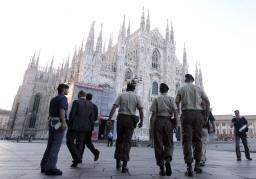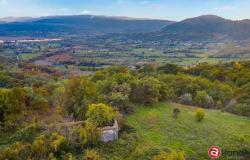The first group of soldiers went on duty in Italian cities on Monday as a controversial government scheme to use 3,000 troops to help police fight crime got under way.
Under the plan coordinated by the interior and defence ministries, 2,000 troops will guard ''sensitive sites'' such as embassies and government buildings, while another 1,000 will join police on mixed street patrols of large cities.
''This isn't a magic wand, but without a doubt it's an important measure for which all Italians, and especially those living in the cities involved, should be grateful,'' said Interior Undersecretary Alfredo Mantovano, in the southern city of Bari to launch the first mixed patrols.
Defence Minister Ignazio La Russa echoed Mantovano as he watched troops go on duty in Milan, saying the scheme was ''a step in the right direction''.
''Concretely, there is a stronger perception of safety, an important element which responds to the needs expressed by citizens,'' he said.
The scheme has come under heavy fire from the centre-left opposition, who say the deployment is a stunt to meet an alleged crime and immigration emergency which is not borne out by statistics.
They also predict it will backfire by scaring tourists off while doing little to deter criminals.
But La Russa defended the plan, reiterating that only ''vandals, rapists and those who commit theft and robbery'' have anything to fear from the presence of the soldiers.
''These men have no intention of striking terror in any normal citizen - only the criminals,'' he said.
''Ask those who live in zones at risk, ask those who live near Milan's central station where there have been nine rapes in just a few weeks whether we are responding to the requests of the citizens,'' he added.
In Rome, which with over 1,000 troops will have the largest contingent of armed forces, around 400 soldiers went on duty on Monday at suburban metro stations and sensitive sites.
''As you can see, there are no soldiers patrolling the historic centre, but only at sites such as embassies, at stations and at the immigration holding centre on the outskirts of the city - in other words, in places where they will not influence the daily life of residents,'' said Rome Mayor Gianni Alemanno, who has pledged to make sure the capital will not look like a city under siege.
Alemanno said last week that he would not allow mixed street patrols of troops and police in the historic centre in a bid to keep the city's tourist-friendly image.
Meanwhile, a mixed patrol at the suburban metro station of Anagnina on Monday nabbed a Romanian pickpocket just a few hours after going on duty after an elderly woman had her wallet stolen.
TROOPS SPREAD ACROSS THE COUNTRY.
The troops who will guard embassies, government buildings, immigration holding centres and other sensitive sites have been placed at the disposal of 16 mayors in cities ranging from Agrigento, Siracusa, Bari and Naples in the south to Turin and Milan in the north. This will free up police for regular crime fighting.
The remaining 1,000 troops will patrol the streets of Bari, Catania, Milan, Naples, Padua, Palermo, Padua, Rome, Turin and Verona.
Patrol troops are dressed in fatigues and will carry only small arms while those guarding sensitive sites have body armour and machine guns.
City prefects will set rules of engagement at regular meetings on public order.
Rome has the most soldiers on the streets, 195, followed by Milan with 170 and Naples with 150.
The troops will be deployed for six months, but the government has said it may extend the scheme for a further six months if it proves successful.
Troops from the army, navy, air force and paramilitary police are being deployed under the scheme.










